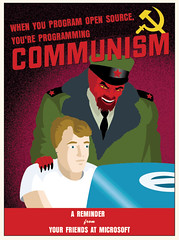Since I’ve been going on about the open source movement this week, I thought I’d republish for you a piece I did originally for the May 25, 207 issue of the Politics In Minnesota newsletter:
It’s often amusingly accurate: The type of
technology you favor often
predicts your ideological leanings. Mac
users, for example, are passionate about
their computers and can often be heard
railing against Microsoft, the evil
megacorporation; the irony of their passion
for Apple, another megacorporation,
apparently lost on them. The same phenomenon
can often be seen playing out with
Internet technologies, as well.
There are two primary technologies used to
create complex database-driven web
sites and application: Microsoft’s ASP
and the open source PHP.
Both programming languages are fine and will
do the job. The primary difference
between them comes down to one basic thing:
cost. Microsoft technology requires
licenses and software purchases and the
software required for PHP sites is free.
Free versus paid. Open source versus
proprietary. This may explain why tech
people who lean conservative are more likely
to use Microsoft technologies while
the more liberal tech people tend to favor
open source; and it plays into all
the political stereotypes.
Those who favor Microsoft technology
are more likely to come from the
corporate environment and probably have
more money to pay for software.
Those who favor PHP, on the other hand, are
more likely to come from a nonprofit
environment or are freelancers for whom
the savings on software are
significant.
Proprietary software such as Microsoft’s
is more top-down because it prohibits
the user from modifying or enhancing the
source code. And the purpose of
Microsoft software, of course, is first and
foremost to make money. Open source
software, on the other hand, is about
collaborating and sharing and creating a
pool of resources (i.e. property) which
anyone can use and/or improve in order
to enrich the commons rather than
the individual.
The economic stereotypes fall into place.
On Monday, the Washington
Post ran a story saying that
Republicans are well behind Democrats in
online politics. That may be explained by the
aforementioned embrace of the
respective technologies both in fact and
philosophy.
The open source movement has gained
tremendous momentum largely due to the
fact that open programming platforms
such as PHP and JavaScript have powered
Web 2.0, the Internet as it looks today.
Liberal tech people therefore have more
experience, skills, and expertise using the
current lingua franca of the Web.
Further, it is the notion of open source
(where anyone can contribute) that
informs much of what is driving Internet
content today. Wikipedia
is a massive online encyclopedia to which
anyone can contribute and/or edit.
Blogs (and, increasingly, newspapers)
allow anyone to comment and hold a discussion
pertaining to a given blog post.
User-created content seeds such sites as YouTube
and Flickr. And
social
networking sites such as MySpace
and Facebook
and Twitter,
make it easy to find and communicate with
people of similar interests.
Such a chaotic environment may feel
comfortable to debate-loving liberals but
not so much to message-disciplined
conservatives.
As if to confirm this ideological
breakdown, the last remaining prominent
Communist,
Cuba’s own Fidel Castro, has encouraged
his country to adopt
open source technology while Brazil’s
Lula
Da Silva began migrating government
computers to the open source Linux
operating system in
2004.
The e-Strategy Academy covers all aspects of digital marketing including search optimization & marketing, email marketing, social media marketing, video marketing, mobile marketing & public relations.
